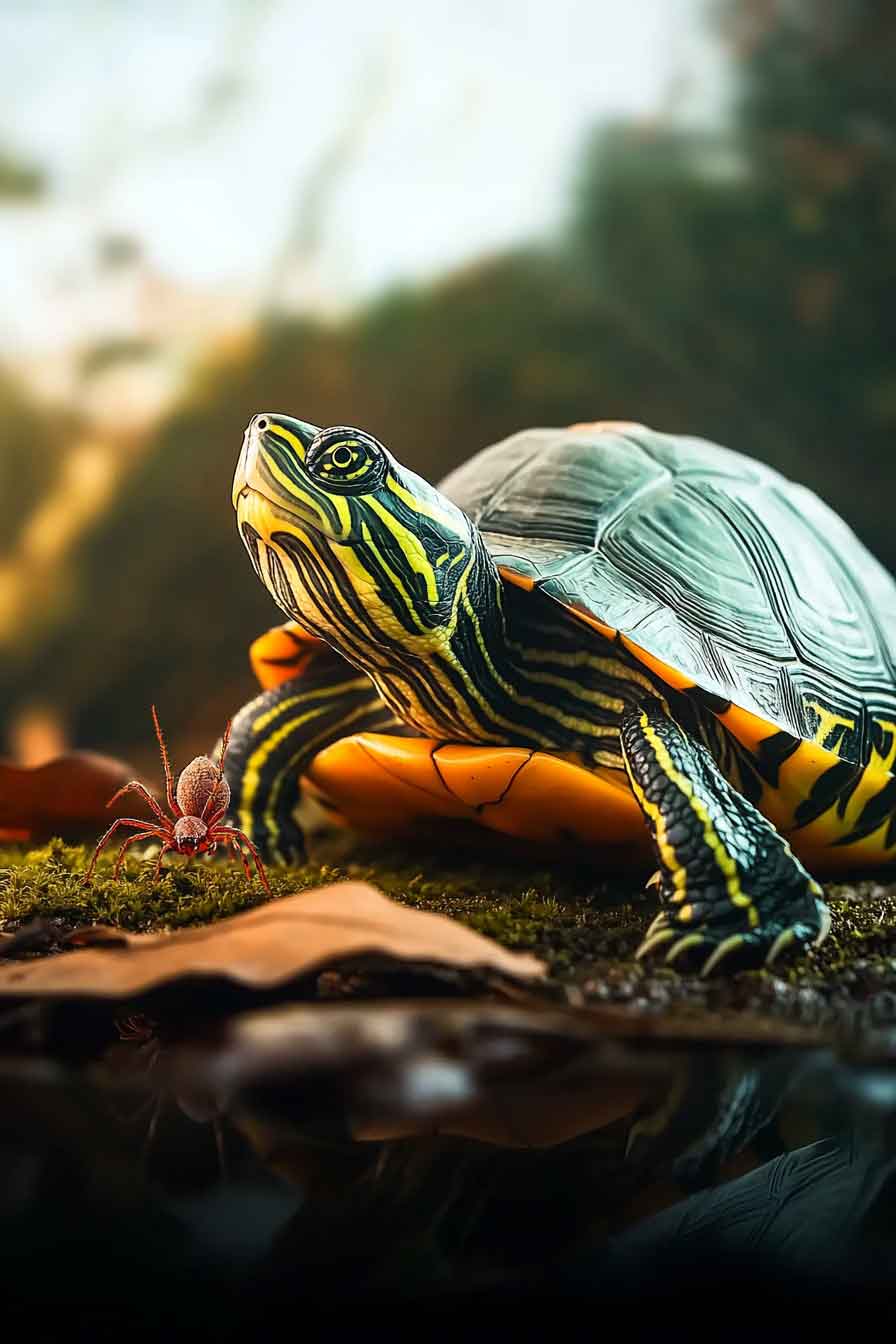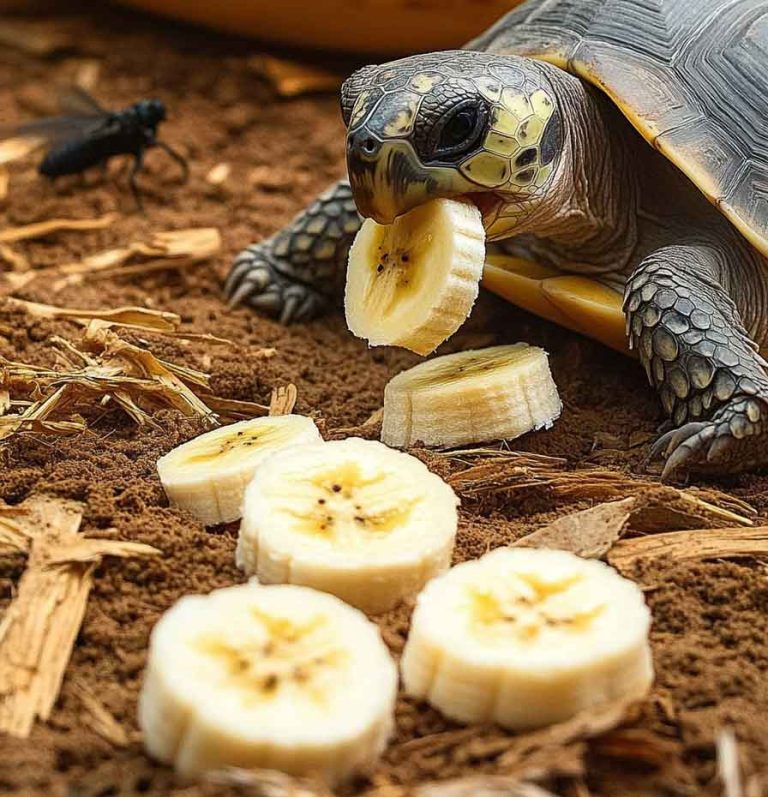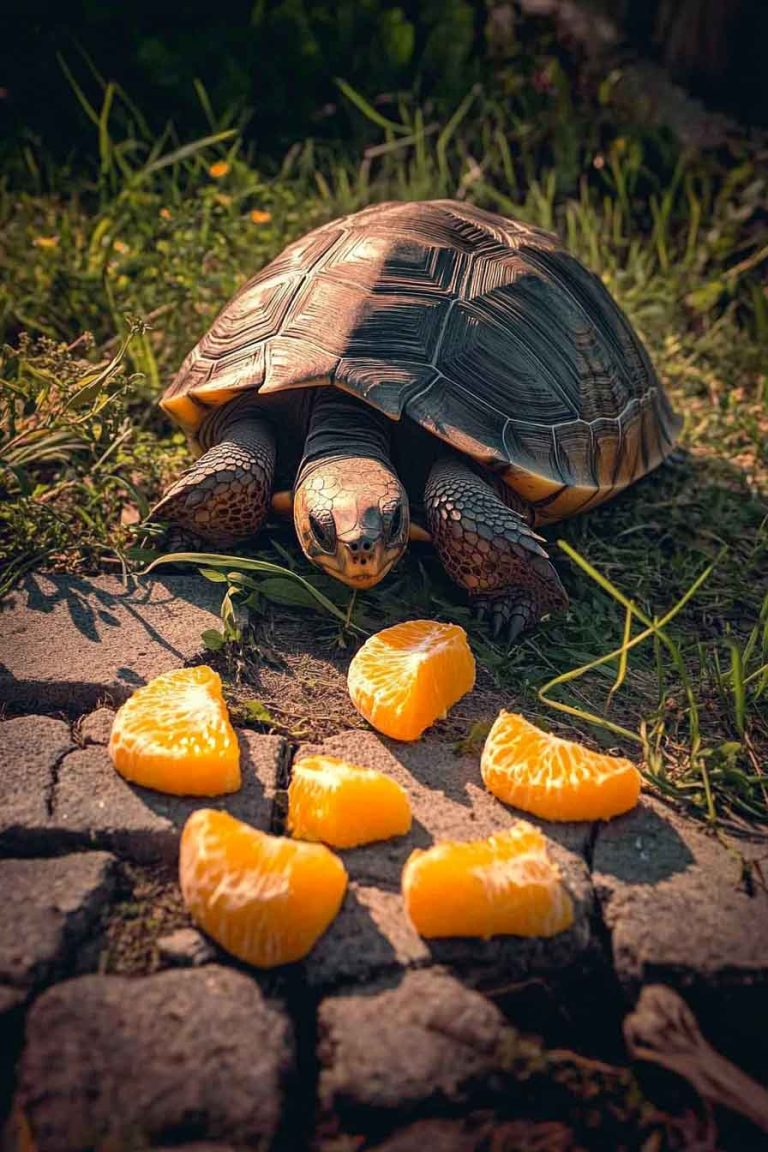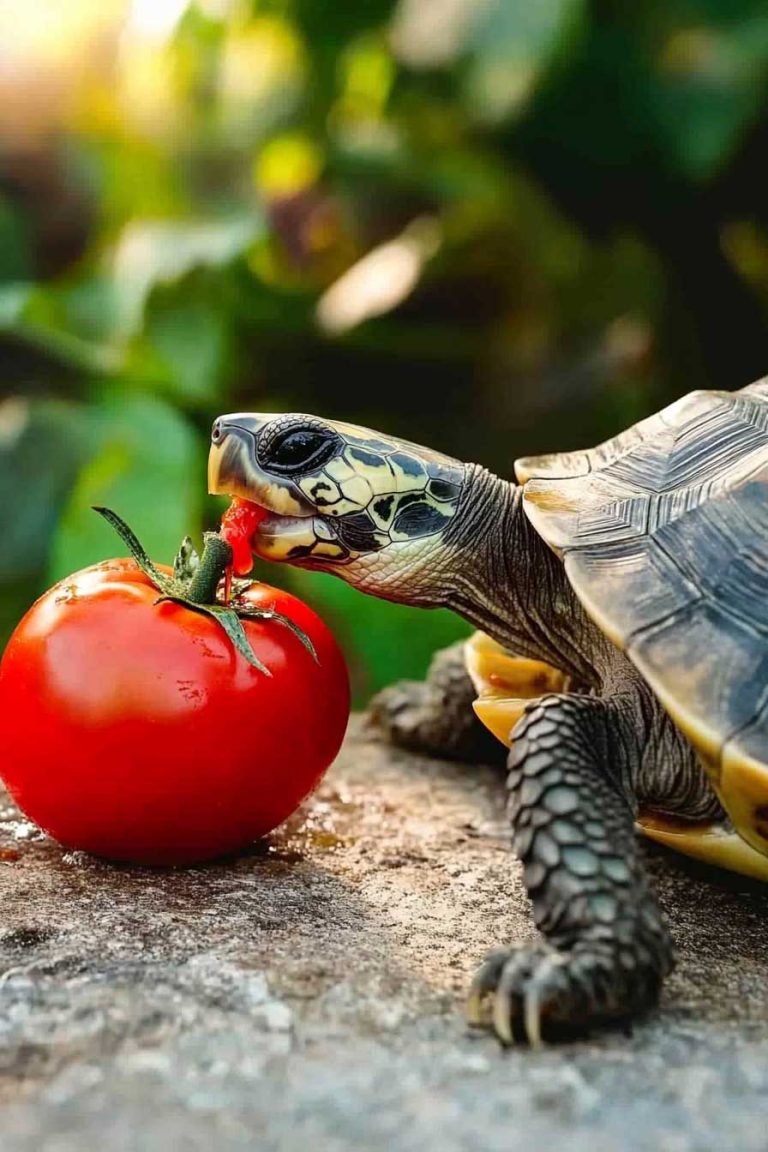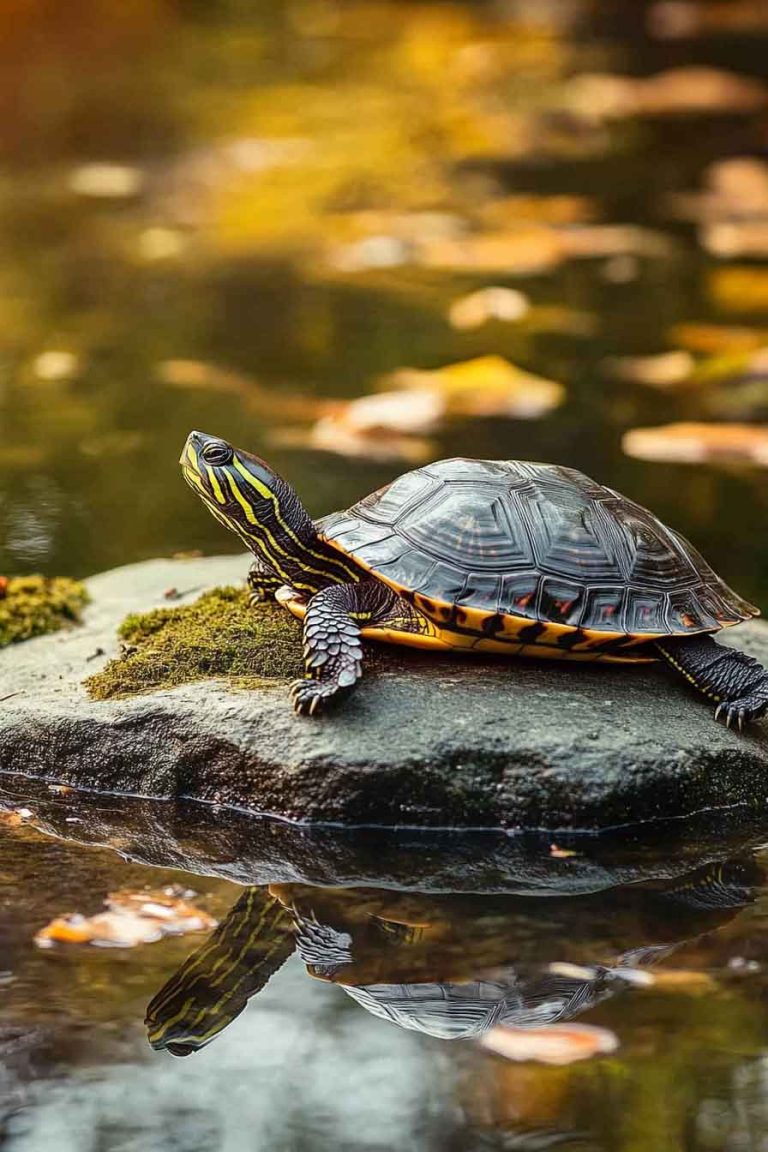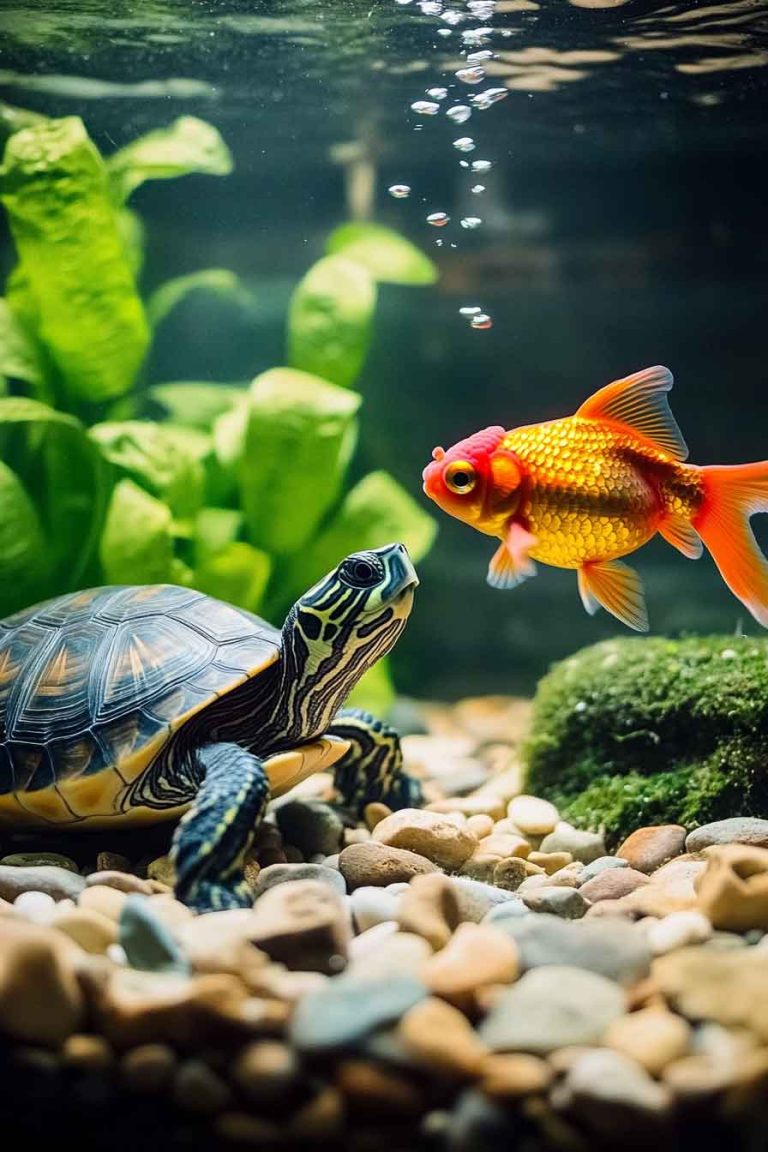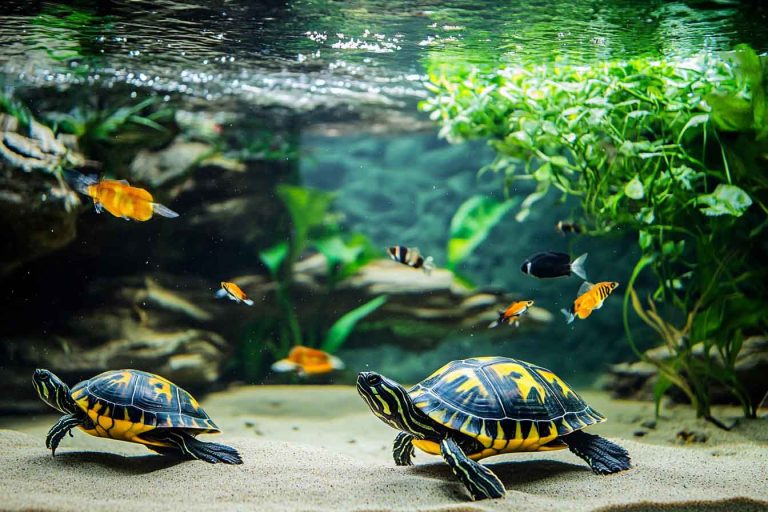Can Turtles Eat Spiders? Risks, Facts & Safer Insect Options
If you’ve got a turtle like I do, you’ve probably seen it try to chase a spider across the floor or in the garden. I remember the first time I saw my box turtle snap up a spider—I froze. I didn’t know whether to laugh… or worry. So I did what most pet owners do….
If you’ve got a turtle like I do, you’ve probably seen it try to chase a spider across the floor or in the garden. I remember the first time I saw my box turtle snap up a spider—I froze. I didn’t know whether to laugh… or worry. So I did what most pet owners do. I asked the big question:
Can turtles eat spiders? The answer is yes—they can, but that doesn’t mean they should. Just like with a lot of other bugs, some spiders are safe, and some are not. And if your turtle is a curious little hunter (like mine), you’ll want to know which is which.
In this post, I’ll walk you through everything I’ve learned—which spiders are okay, what risks they bring, and whether box turtles are different from others. I want to help you keep your turtle safe, happy, and healthy.
Can You Feed Spiders to Your Pet Turtle?
Let’s get straight to the point: You shouldn’t feed spiders to your turtle on purpose.
Now I get it—turtles in the wild eat bugs all the time. They’re natural scavengers. If it crawls or moves, your turtle will probably try to eat it. That includes spiders, ants, flies, beetles—you name it.
But here’s the thing: just because they can eat something doesn’t mean it’s safe every time.
Some spiders, especially house spiders, may seem harmless. And yes, if your turtle catches one on its own, it might be fine. But you’ve got to be careful because:
- Spiders might carry pesticides: If a spider has walked through insect spray or poison traps, that chemical can still be inside its body. If your turtle eats that spider, they could end up eating poison too.
- Some spiders are venomous: Most turtle species are tough, but they’re not immune to venom. A bite from a black widow or brown recluse might not kill your turtle instantly, but it can cause swelling, sickness, or even organ problems over time.
- Wild spiders might carry parasites or bacteria: Just like dirty water or unwashed food, a wild-caught spider could give your turtle a gut infection.
So no, I don’t feed spiders to my turtle. Even though he loves bugs, I stick to safer choices that I know won’t make him sick.
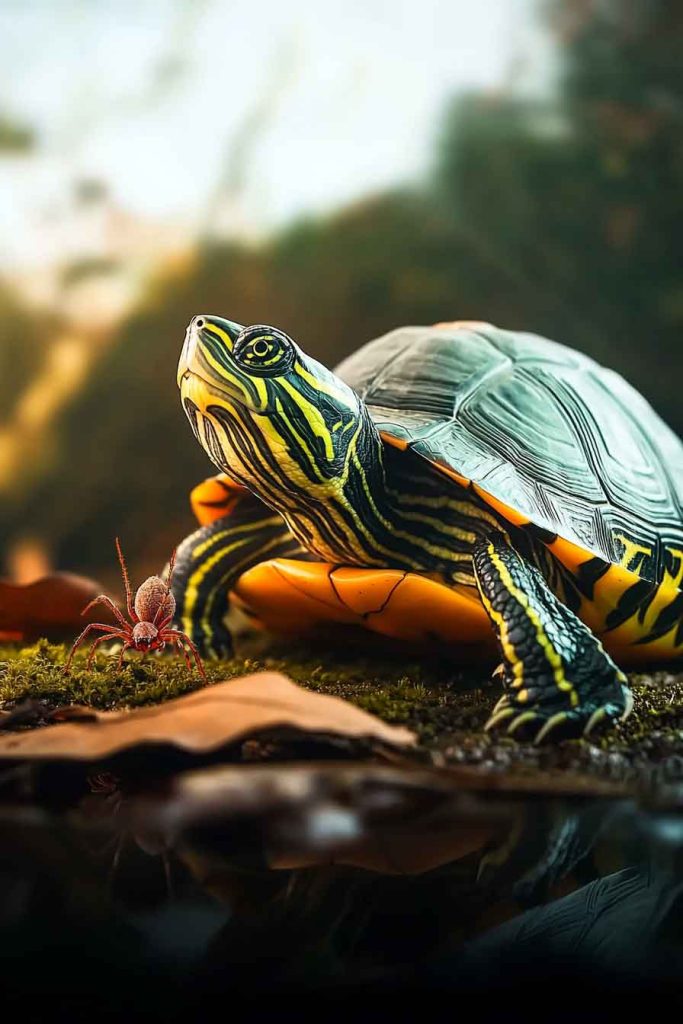
What Happens If a Turtle Eats a Spider?
Okay, let’s say your turtle already ate a spider. Should you panic?
It depends on a few things.
1. Was the spider venomous?
If the spider was a non-venomous house spider, chances are your turtle will be just fine. Most turtles have strong stomachs that can break down small insects and spiders without a problem. You probably won’t even see any changes in behavior.
But if you think it might’ve been a venomous spider, like a black widow, brown recluse, or wolf spider, keep a close eye on your turtle. You might notice:
- Not eating
- Moving less than usual
- Swelling near the mouth
- Gasping or open-mouth breathing
- Vomiting
- Acting like it’s in pain
These signs mean something is wrong. Call a reptile vet immediately. Don’t wait it out—spider venom can do slow damage, and quick care makes a huge difference.
2. Was the spider exposed to chemicals?
If the spider came from indoors—especially near a sprayed wall or bug trap—there’s a risk it had insecticides in or on its body. That’s dangerous.
Even tiny amounts of bug spray can harm turtles. I once read about a turtle that got sick from eating a roach that had walked across ant powder. It doesn’t take much.
So again—watch your turtle closely after any wild bug encounter. If anything seems off, get help fast.
Health Risks of Turtles Eating Spiders
So, what exactly can go wrong if your turtle eats a spider? I’ve spent a lot of time looking into this—and let me tell you, the risks are very real.
1. Spider Venom
Most common house spiders aren’t deadly, but some—like black widows, brown recluses, or hobo spiders—have venom that can be dangerous. And even if a spider isn’t strong enough to kill a turtle, a bite can still cause damage.
If the spider is eaten alive, it may bite inside your turtle’s mouth or throat, leading to swelling, breathing trouble, or infection. And even if it’s already dead, some venom can remain in the spider’s body and still affect your turtle’s health.
2. Parasites and Bacteria
Wild spiders crawl around in dirty places—under leaves, in dusty corners, or through old garbage. That makes them a carrier for parasites and harmful bacteria.
If your turtle eats one of these bugs, they might get an infection in their stomach or gut. You may see symptoms like:
- Diarrhea
- Lethargy
- Refusing food
- Weight loss
I always recommend sticking to clean, store-bought feeder insects when you want to treat your turtle with bugs.
3. Pesticide Poisoning
This is a big one. Spiders that come from your home or garden might’ve walked through insect sprays, poison baits, or chemical cleaners. Even a small trace of poison inside that spider can seriously harm your turtle.
Pesticide poisoning may not show symptoms right away. But it can lead to:
- Liver problems
- Organ failure
- Weakness
- Loss of appetite
- And in some cases, death
If your turtle ever eats a spider that may have touched chemicals, it’s best to call a vet and explain the situation. It’s always better to be safe than sorry.
Do Spiders Have Any Nutrition for Turtles?
This part might surprise you. Spiders actually do have some nutritional value—but that doesn’t make them a great food choice.
Spiders are made up of:
- Protein – which turtles need for muscle growth
- Fat – which helps with energy
- Chitin – the hard outer shell that can be difficult to digest
- No calcium – which turtles need for shell and bone health
So yes, they give a little protein and fat, but they’re not balanced. They lack key minerals like calcium, which is super important for turtle growth—especially for baby turtles.
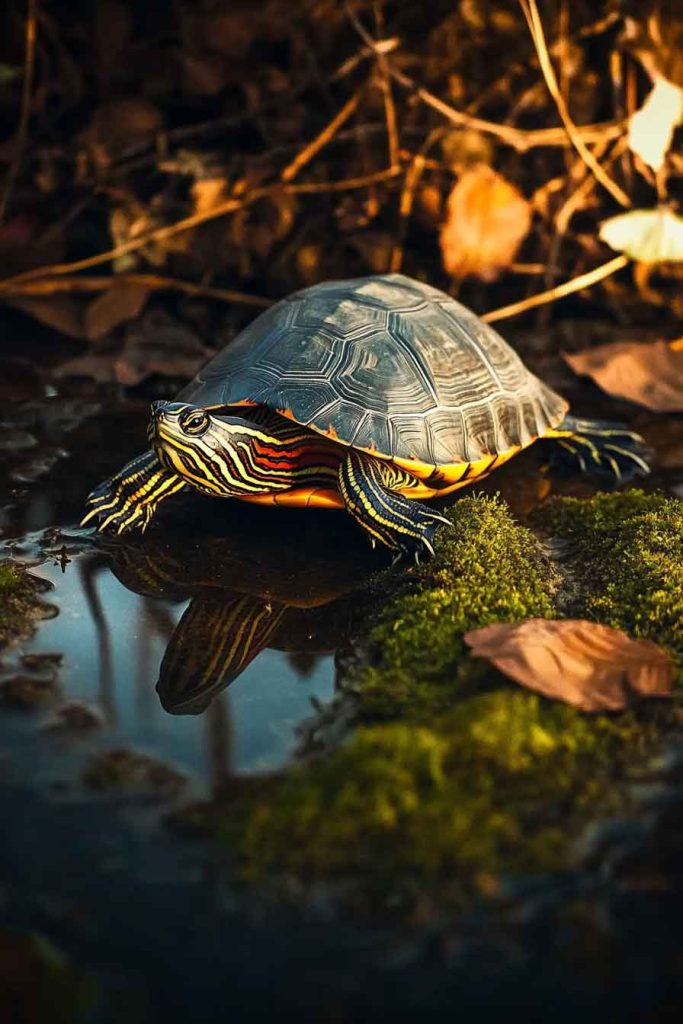
Can Baby Turtles Eat Spiders?
This is where things get even more risky.
Baby turtles should never eat spiders. Their bodies are still developing, and they have much weaker immune systems. That means even small threats—like a little bit of venom, bacteria, or pesticide—can make them very sick.
I never take chances with baby turtles. They need soft, clean, easy-to-digest food—like boiled egg yolk, bloodworms, or finely chopped greens. Spiders are way too rough, too risky, and not worth the trouble.
Are Spiders Good for Box Turtles?
Now, if you’re a box turtle owner like me, you might wonder if your turtle is different from others. After all, box turtles are omnivores—they eat bugs, fruits, veggies, and even meat sometimes.
So does that mean spiders are okay for them?
Not really. Box turtles might try to eat a spider if they see one, especially outside. But the same risks still apply:
- They can get sick from spider venom
- They can choke on a large spider
- They can catch parasites or ingest toxins from pesticides
So even though box turtles have a stronger stomach than baby turtles, spiders still aren’t a smart or safe option.
I like to give my box turtle safe insects that I buy from a pet store—like crickets, mealworms, or waxworms. They’re clean, nutritious, and way less risky.
What Are Safer Insects for Turtles?
If your turtle loves chasing bugs, there are plenty of safe alternatives you can try instead of spiders. These are not only safer—they’re also more nutritious and easier to digest.
Here’s a list I personally use:
- Crickets – High in protein, and easy to find at pet stores
- Mealworms – A great snack, but not too often because of fat
- Bloodworms – Perfect for water turtles and easy to digest
- Earthworms – Natural and full of moisture
- Dubia roaches – Clean, protein-rich, and safe for all turtle types
- Boiled eggs (chopped) – For a soft, high-protein boost
- Turtle pellets – Always a balanced option for daily feeding
All of these are better choices than letting your turtle eat a random spider off the floor.
Frequently Asked Questions (FAQs)
Can turtles get poisoned from eating spiders?
Yes, they can. If the spider is venomous or has touched pesticides, it can make your turtle very sick. Always keep an eye on your turtle after it eats a wild insect.
Do turtles eat spiders in the wild?
Yes, turtles in the wild sometimes eat spiders when they come across them. But in the wild, turtles are constantly moving, which helps them process risky foods better than pet turtles. That’s why it’s not always safe to copy what happens in nature.
Can I feed pet-store spiders to my turtle?
It’s still not recommended. Even if they’re clean, spiders offer poor nutrition and might cause choking or digestion issues. Safer bug options are available.
What should I do if my turtle ate a spider?
Watch closely for signs like vomiting, tiredness, not eating, or swelling. If you see anything odd—or if you think the spider was venomous—call a vet right away.
Conclusion
So, can turtles eat spiders? Yes. But should they? Not really.
Spiders are part of a turtle’s natural diet in the wild, but in a home setting, they come with too many risks—venom, chemicals, bacteria, and poor nutrition. I always say, just because something is natural doesn’t mean it’s safe.
If you care about your turtle’s health like I do, it’s best to skip the spiders and stick to clean, protein-rich bugs that are made for reptiles.
Trust me—your turtle will still enjoy the hunt, and you’ll enjoy knowing they’re safe.

